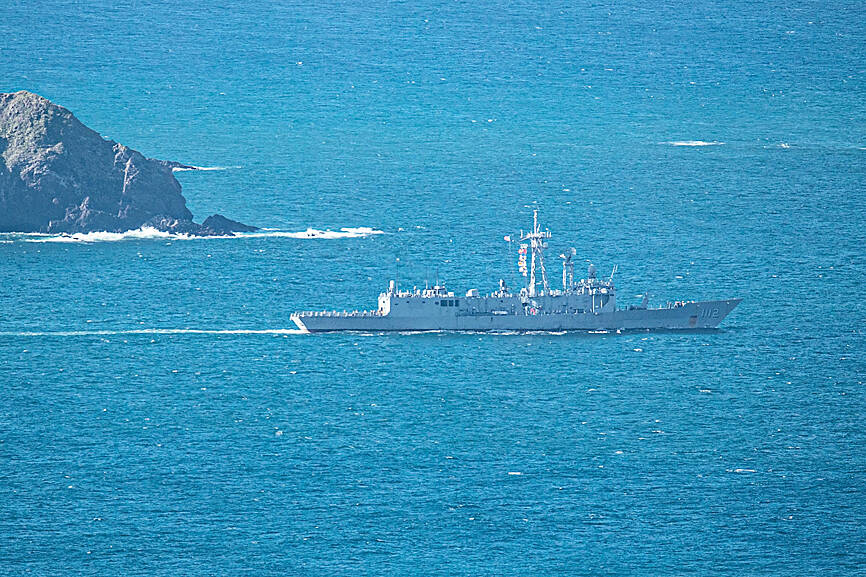Two defense experts on Saturday said that the military should consider rescheduling the live-fire component of the Han Kuang series of exercises, which was called off due to Typhoon Gaemi.
This year’s live-fire component of the Han Kuang military exercises was scheduled to take place from Monday to Friday last week, but was cut short on Thursday after Taiwanese troops were mobilized to assist in disaster relief following Typhoon Gaemi.
Last year, the military canceled a scheduled emergency landing and takeoff drill at Taitung Airport, in the east of the country, due to Typhoon Doksuri.

Photo: The Ministry of Defense via AFP
To prevent the annual drill from being cut short again and wasting a chance for the military to practice its defensive strategy, the Ministry of National Defense should consider rescheduling them, two defense academics said.
Su Tzu-yun (蘇紫雲), a research fellow at the state-run Institute for National Defense and Security Research, said the ministry should move the exercuses’ live-fire component from July to June as it would minimize the chance of the exercises being affected by typhoons.
Chieh Chung (揭仲), a researcher at the Taiwan-based Association of Strategic Foresight, said that because the Han Kuang exercises feature two components — a computerized wargames component in the first half of the year, and live-fire exercises in the second half of the year — the ministry should consider swapping their timing. The computerized wargames are normally held in April or May.
This would maximize the chance of avoiding typhoon disruptions and give college graduate conscripts, who tend to begin compulsory service after graduation, more time to undergo basic training and hone their expertise, before putting their training into action, Chieh said.
The ministry made positive changes to this year’s exercises, including “unscripted” combat scenarios that better simulate real-life battlefield conditions, Chieh said.
Previously, troops participating in the Han Kuang drill were informed about the scenarios beforehand, including when and where the simulated “invading force” would appear, so soldiers knew what to expect, he said.
This meant troops tended to focus less on defensive posts and overall defense tactics, he added.
The “unscripted” focus this year meant the simulated enemy attack could happen anywhere, at any time and with any weapon system, he said.
This meant troops had to familiarize themselves with the overall environment and practice different scenarios, Chieh said.
Another focus of this year’s Han Kuang exercises was to test the military’s decentralized command structure with exercises that monitor units’ decisionmaking capabilities after losing contact with central command.
Each soldier was also expected to follow updated Rules of Engagement (ROE) that outline the circumstances under which they are authorized to use certain weapons or launch counterattacks.
It is a pity that due to Typhoon Gaemi, the decentralized command structure has yet to be put to the test, Chieh said.
The ministry should consider testing each military unit’s familiarity with the updated ROE and decentralized command structure during the “combat readiness month” exercises held once every quarter, he added.
Asked about Chieh’s recommendation, a military general speaking on condition of anonymity said the ministry would assess the scenarios that were supposed to be tested in this year’s Han Kuang drills.

Chinese Nationalist Party (KMT) Chairman Eric Chu (朱立倫), spokeswoman Yang Chih-yu (楊智伃) and Legislator Hsieh Lung-chieh (謝龍介) would be summoned by police for questioning for leading an illegal assembly on Thursday evening last week, Minister of the Interior Liu Shyh-fang (劉世芳) said today. The three KMT officials led an assembly outside the Taipei City Prosecutors’ Office, a restricted area where public assembly is not allowed, protesting the questioning of several KMT staff and searches of KMT headquarters and offices in a recall petition forgery case. Chu, Yang and Hsieh are all suspected of contravening the Assembly and Parade Act (集會遊行法) by holding

PRAISE: Japanese visitor Takashi Kubota said the Taiwanese temple architecture images showcased in the AI Art Gallery were the most impressive displays he saw Taiwan does not have an official pavilion at the World Expo in Osaka, Japan, because of its diplomatic predicament, but the government-backed Tech World pavilion is drawing interest with its unique recreations of works by Taiwanese artists. The pavilion features an artificial intelligence (AI)-based art gallery showcasing works of famous Taiwanese artists from the Japanese colonial period using innovative technologies. Among its main simulated displays are Eastern gouache paintings by Chen Chin (陳進), Lin Yu-shan (林玉山) and Kuo Hsueh-hu (郭雪湖), who were the three young Taiwanese painters selected for the East Asian Painting exhibition in 1927. Gouache is a water-based

Taiwan would welcome the return of Honduras as a diplomatic ally if its next president decides to make such a move, Minister of Foreign Affairs Lin Chia-lung (林佳龍) said yesterday. “Of course, we would welcome Honduras if they want to restore diplomatic ties with Taiwan after their elections,” Lin said at a meeting of the legislature’s Foreign Affairs and National Defense Committee, when asked to comment on statements made by two of the three Honduran presidential candidates during the presidential campaign in the Central American country. Taiwan is paying close attention to the region as a whole in the wake of a

OFF-TARGET: More than 30,000 participants were expected to take part in the Games next month, but only 6,550 foreign and 19,400 Taiwanese athletes have registered Taipei city councilors yesterday blasted the organizers of next month’s World Masters Games over sudden timetable and venue changes, which they said have caused thousands of participants to back out of the international sporting event, among other organizational issues. They also cited visa delays and political interference by China as reasons many foreign athletes are requesting refunds for the event, to be held from May 17 to 30. Jointly organized by the Taipei and New Taipei City governments, the games have been rocked by numerous controversies since preparations began in 2020. Taipei City Councilor Lin Yen-feng (林延鳳) said yesterday that new measures by